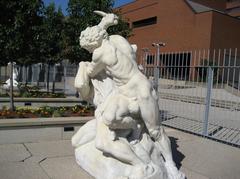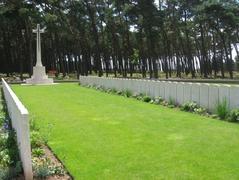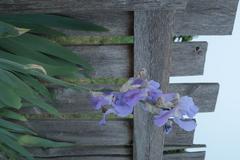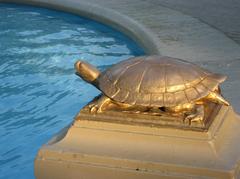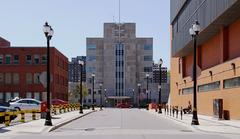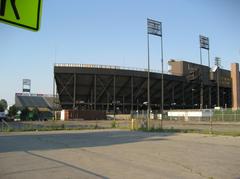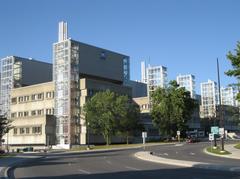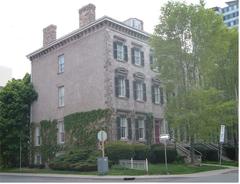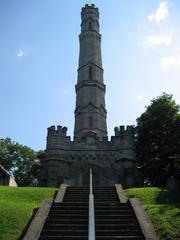Royal Botanical Gardens Hamilton: Visiting Hours, Tickets, and Travel Guide
Date: 14/06/2025
Introduction
The Royal Botanical Gardens (RBG), straddling Hamilton and Burlington, Ontario, is Canada’s largest botanical garden, encompassing over 2,400 acres of cultivated gardens and protected nature sanctuaries. Established in the early 20th century under the vision of Thomas Baker McQuesten and shaped by renowned landscape architects like Carl Borgstrom and Howard Dunington-Grubb, RBG stands today as a beacon of horticultural excellence, conservation, and cultural heritage. Recognized as a National Historic Site of Canada and a key component of the Niagara Escarpment UNESCO World Biosphere Reserve, the Gardens invite visitors to explore striking landscapes, rare plant collections, and vibrant community programs (Parks Canada; RBG History).
This guide offers everything you need to plan your visit, including up-to-date information on RBG’s visiting hours, ticketing options, main attractions, and nearby Hamilton historical sites.
Table of Contents
- Royal Botanical Gardens: History and Significance
- Planning Your Visit: Hours, Tickets, and Tips
- Main Garden Areas and Attractions
- Visitor Amenities and Accessibility
- Seasonal Highlights and Special Events
- Nearby Hamilton and Burlington Historical Sites
- Frequently Asked Questions (FAQ)
- Visual Highlights and Interactive Media
- References
Royal Botanical Gardens: History and Significance
Origins and Early Development
The vision for RBG emerged in the 1920s, when Hamilton’s Board of Park Management, led by Thomas Baker McQuesten, sought to transform the region’s natural landscapes into a world-class horticultural and conservation site. The city acquired land for the “Dundas Marsh Crown Game Preserve” in 1927, and a design competition the following year led to Carl Borgstrom’s creation of the Rock Garden—RBG’s original display garden, ingeniously repurposing an abandoned gravel pit (Parks Canada; Toronto Guardian).
Royal Designation and Expansion
King George V granted the “Royal” designation in 1930, elevating the Gardens’ profile. By 1941, RBG was formally established, expanding its reach with new gardens, conservation areas, and educational facilities. Unique for its time, the RBG’s layout connected discrete gardens and nature sanctuaries via parkways and trails, embedding horticultural beauty in the broader urban and natural landscape (RBG History).
National and International Recognition
RBG was designated a National Historic Site of Canada in 1994, recognizing its horticultural collections, landscape design, and leadership in conservation and education. Its status as part of the Niagara Escarpment UNESCO World Biosphere Reserve further underscores its ecological significance (BGCI; Toronto Guardian). In 1975, RBG became the International Registration Authority for cultivated lilacs (Parks Canada).
Horticultural and Conservation Significance
RBG’s gardens house over 180,000 plants representing more than 2,300 species, including renowned collections of lilacs, roses, irises, peonies, and native flora. Its nature sanctuaries, such as Cootes Paradise and Hendrie Valley, protect vital wetland, forest, and meadow ecosystems. RBG’s conservation work includes invasive species management, habitat restoration, and ecological research (Destination Ontario; Trips to Uncover).
Cultural and Educational Impact
RBG is a hub for education and community engagement, offering guided tours, workshops, and seasonal festivals. Initiatives like the Journey to Anishinaabe Knowledge Trail, developed with Indigenous partners, celebrate cultural heritage and stewardship. RBG collaborates with schools, universities, and community groups, advancing plant science and environmental awareness (Tourism Hamilton).
Planning Your Visit: Hours, Tickets, and Tips
Visiting Hours
- Spring/Summer (April–October): 10:00 AM – 6:00 PM
- Fall/Winter (November–March): 10:00 AM – 4:00 PM
Special event hours may apply. Check the RBG official website for the latest updates.
Ticket Information
- Adults: $15
- Seniors (65+): $13
- Youth (6–17): $8
- Children under 6: Free
- Annual Memberships: Available with added benefits
Tickets can be purchased online in advance (recommended during peak seasons/events) or at the visitor centre (Destination Ontario).
Accessibility and Facilities
- Most main gardens and visitor facilities are wheelchair accessible.
- Wheelchairs available on a first-come, first-served basis; support persons are admitted free.
- On-site cafés and bistros offer seasonal fare.
- Secure bike parking is available.
Tips for Visitors
- Best Time to Visit: Mid-May through June for the Lilac Festival and spring blooms.
- Parking: Ample parking with fees at most entrances.
- Family-Friendly: Interactive exhibits, playgrounds, and discovery programs for children.
- Pet Policy: Pets are not permitted in cultivated gardens; allowed on some trails (leash required).
Main Garden Areas and Attractions
Hendrie Park
The largest cultivated garden, featuring themed gardens such as the Rose Garden (blooming June–September), Scented Garden, Veggie Village, Indigenous Plants Garden, and reflecting pools (RBG Gardens & Trails).
RBG Centre & Mediterranean Garden
The main visitor hub, with ticketing, information, the Mediterranean Garden (an indoor conservatory with Mediterranean-climate and arid plants), the Garden Shop, and the Greenhouse Café. Seasonal exhibits like “Alice in Bloomland” take place here (Klook).
Rock Garden
A historic garden with dramatic rock formations, spring bulbs, perennial displays, water features, and the Rock Garden Bistro. Accessible pathways and a tranquil atmosphere make it a visitor favorite (Klook; What’s in Bloom).
Laking Garden
Renowned for irises (mid-May to June), peonies (June), clematis, daylilies, and educational signage. Best visited late spring to early summer (RBG Laking Garden Info).
The Arboretum
Home to large collections of magnolias, cherries, lilacs (peak in May), meadows, tree-lined avenues, and scenic trails. Autumn features spectacular foliage (Klook).
Nature Sanctuaries & Trails
Over 27 km of trails wind through Cootes Paradise, Hendrie Valley, and other protected habitats, offering birdwatching, wetlands, and interpretive programs (RBG Trails).
Visitor Amenities and Accessibility
- Parking: Available at all main garden areas ($3/hour, daily maximums apply).
- Public Transit: Bus routes connect to RBG Centre.
- Dining: Greenhouse Café, Rock Garden Bistro, and Turner Pavilion Teahouse.
- Gift Shop: Botanical gifts, books, plants, and souvenirs.
- Restrooms: Accessible facilities at all major entrances.
- Wi-Fi: Available at RBG Centre.
Seasonal Highlights and Special Events
- Spring: Tulips, magnolias, lilacs, irises, and the Lilac Festival.
- Summer: Roses, peonies, lilies, music nights, and art installations.
- Autumn: Ornamental grasses, sunflowers, and vibrant foliage.
- Winter: Mediterranean Garden, special exhibits like “Alice in Bloomland” and “Winter Wonders”.
Check the RBG events calendar for the latest programs.
Nearby Hamilton and Burlington Historical Sites
Enhance your visit by exploring:
- Dundurn Castle: Historic mansion with guided tours.
- Canadian Warplane Heritage Museum: Aviation history and vintage aircraft.
- Burlington Waterfront Trail: Scenic lakeside walks.
- Hamilton Art Gallery: Regional art and exhibitions.
Frequently Asked Questions (FAQ)
Q: What are the Royal Botanical Gardens visiting hours?
A: Typically 10:00 AM–6:00 PM in spring/summer, 10:00 AM–4:00 PM in fall/winter. Check the official website for current hours.
Q: How much are tickets?
A: Adults $15, seniors $13, youth $8, children under 6 free. Special events may have separate pricing.
Q: Is the site wheelchair accessible?
A: Yes, most main gardens and facilities are accessible. Wheelchairs available at RBG Centre.
Q: Are pets allowed?
A: Pets are not permitted in cultivated gardens; leashed pets may be allowed on certain trails.
Q: Are guided tours available?
A: Yes, guided tours and workshops are offered; check schedules online.
Visual Highlights and Interactive Media
- Panoramic views of the Rock Garden and Arboretum in bloom.
- Images of the Mediterranean Garden and Lilac Festival.
- Interactive map of RBG for planning your route.
All images should use keyword-rich alt text such as “Royal Botanical Gardens Hamilton spring blooms” for SEO and accessibility.
References
- Royal Botanical Gardens History, 2021, Royal Botanical Gardens
- Parks Canada - Royal Botanical Gardens, 1994, Parks Canada
- Destination Ontario - Royal Botanical Gardens, 2023, Destination Ontario
- Toronto Guardian - History of Royal Botanical Gardens, 2021, Toronto Guardian
- Tripstouncover - A Guide to the Royal Botanical Gardens, 2023, Trips to Uncover
- Tourism Hamilton - Royal Botanical Gardens Partner Page, 2023, Tourism Hamilton
- BGCI - Royal Botanical Gardens, 2023, Botanic Gardens Conservation International
- Klook - Royal Botanical Gardens Attractions, 2023, Klook
- Lonely Planet - Royal Botanical Gardens, 2023, Lonely Planet
- TripHobo - Royal Botanical Gardens Visitor Info, 2023, TripHobo
- Nature @ McMaster - Royal Botanical Gardens Overview, 2023, McMaster University
- BGCI Journal - Conservation Efforts at RBG, 2019, BGCI Journal
- RBG Conservation Projects, 2023, Royal Botanical Gardens
- Ultimate Ontario - Visitor Experience at RBG, 2023, Ultimate Ontario
Final Tips
- Download the Audiala app for guided tours and schedules.
- Follow RBG and Audiala on social media for updates and inspiration.
- Review the RBG official website before your visit for the latest on hours, tickets, and events.
The Royal Botanical Gardens promises an unforgettable journey through nature, culture, and history—plan your visit now to experience one of Canada’s most cherished landmarks.
